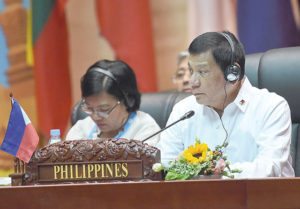THE CANCELLATION of President Rodrigo Duterte’s meeting with US President Barack Obama is likely to raise tensions between the Philippines and US at a time Manila needs the support of allies against China’s military buildup at the West Philippine Sea (South China Sea), analysts said on Tuesday.
Political analyst Ramon Casiple said Duterte’s latest outburst against the US and Obama would likely prompt Washington to review its relations with the Philippine leader.
“Obviously the meeting was postponed because of the statement of the President. He insulted another leader that is why he (Duterte) was cut off,” Casiple said in an interview.
Prof. Richard Javad Heydarian of De La Salle University’s political science department described the cancellation of the planned meeting as a “diplomatic snub.”
“Obama’s diplomatic snub clearly shows growing tensions in Philippine-US bilateral relations,” he told The Manila Times.
But the “fundamentals of bilateral security and economic relations are expected to continue,” he said.
‘Wasted opportunity’
For former Philippine ambassador to Washington Jose Cuisia Jr., the scrapped meeting was a “wasted opportunity” for Duterte, who could have discussed important issues with Obama apart from Washington’s concern over the rising number of deaths of drug suspects.
The ex-diplomat said Obama would have been “very courteous and very polite” in discussing human rights with Duterte, and not in a lecturing manner as earlier reported by the press.
“When you’re partners, you discuss your differences just like what couples do,” he said in an interview with The Manila Times.
“It’s very unfortunate. I hope that it will really not affect the strong bilateral relations between the Philippines and the US,” Cuisia added.
The Philippines is the US’ oldest Asian partner and is designated by Washington as a “major non-North Atlantic Treaty Organization ally.”
Cuisia noted that the Philippines received over $1.3 billion military and economic assistance from the US in recent years.
In Laos, Obama mentioned increased military cooperation with the Philippines, and Presidential Communications Secretary Martin Andanar noted that during the G20 summit, Obama backed the Philippines’ position that China should observe international law in connection with the sea dispute.
Undiplomatic
It was Senate President Pro-Tempore Franklin Drilon who gave Duterte a lecture on Tuesday, on how the President should conduct himself diplomatically.
“Talk about starting off on the wrong foot,” Drilon said in a statement.
“It is unfortunate that such meeting did not push through because of unnecessary rhetoric over human rights issues. We must remember that our foreign policy is shaped in accordance with our national interest. Unfriendly rhetoric and undiplomatic statements will not bring us anywhere,” he said.
Drilon’s colleagues however don’t see any negative consequences from Duterte’s tirades.
“I don’t think this would have any long-lasting or serious consequences in PH-US relations,” Senate President Aquilino Pimentel 3rd said in an interview.
Senator Sherwin Gatchalian backed Duterte’s aggressive assertion of Philippine foreign policy independence.
“In a way, it is promising to see that our President is strong enough to rattle even the most powerful leader in the world,” he said.
Senators Juan Edgardo Angara and Joseph Victor Ejercito said the incident could affect the relations between the two nations but this could easily be addressed with skillful diplomacy.
In the House of Representatives, Northern Samar Rep. Raul Daza feared that the Philippines could be headed for isolation.
“I’m afraid that if we continue this kind of course, we might be isolating ourselves from the rest of the world,” he said.



